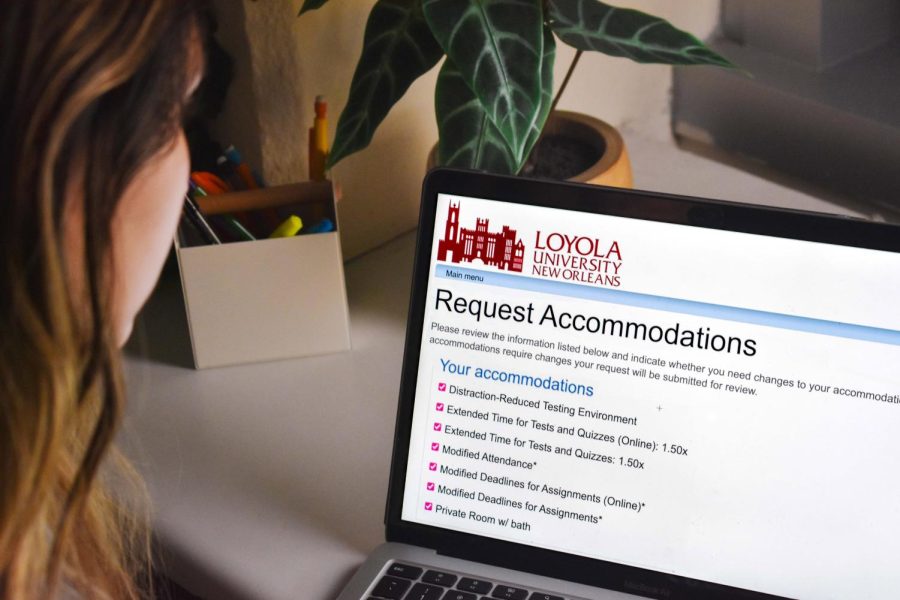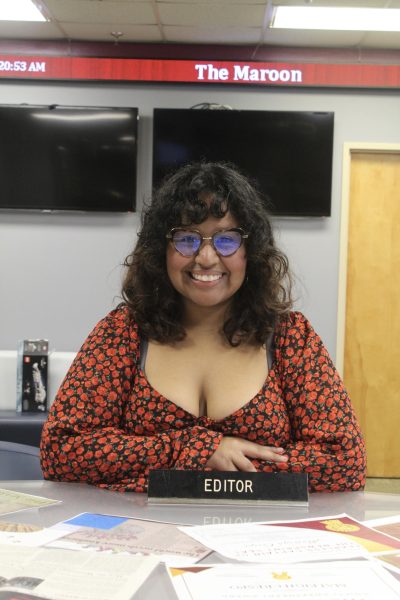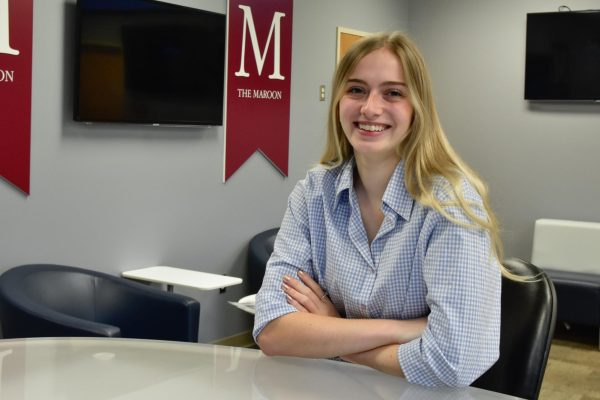Students share their experience with the Office of Accessible Education
Photo illustration
April 20, 2023
Federal data shows that the number of students receiving accommodations has surged in the last several years.
At Loyola, students have mixed feelings about how easy it is to access those accommodations.
Music industry sophomore Aidan O’Connor transferred from Loyola University Chicago, where he struggled to get accommodations. Since transferring, his experience with Loyola New Orleans’ Office of Accessible Education has been great compared to his experience at his previous university, he said.
“It’s really efficient here,” he said. “I was able to quickly get all the accommodations I needed, and they were really helpful.”
O’Connor said the only issue he had was the discrepancy between professors. There’s no written down agreement, so one professor might be more lenient than another, he said.
Director of the Office of Accessible Education Andrea Rodriguez said the office works with faculty every day to ensure they are able to modify their classrooms and assignments to best meet the needs of the students. They work with faculty to determine what is reasonable with the professor’s given classwork and policies and the accommodations of each student, which is often case by case, and ensure those accommodations are being implemented.
Rodriguez said if there’s a misunderstanding between faculty and students, the Office of Accessible Education will work to resolve it.
“The accommodations we write aren’t meant to disrupt class,” Rodriguez said. “They’re meant for our students to be able to step in a classroom and learn – it just may be different for those students.”
Design sophomore Miles Ainsworth had accommodations for his Attention Deficit Hyperactivity Disorder throughout high school, but opted out of getting them at Loyola because they’re “too hard to get.”
Ainsworth said it was very hard to adjust to not having them.
“Making that process complicated and hard and having to go through multiple checkpoints just sets people like me up for failure,” he said. “There’s a reason we have accommodations, so why would you make getting those accommodations harder?”
Rodriguez said the Office of Accessible Education is moving towards an easier process that’s less anxiety-inducing for students.
“We want students to know that we’re here for them,” she said.
Biology senior Olivia Bridges had a similar experience to Ainsworth after being diagnosed with ADHD in her freshman year.
Bridges recalled that the paperwork was the easy part, but receiving the accommodations was hard.
“The first thing they ask you is what accommodations you think you deserve,” she said. “And that was off-putting for me because I didn’t know. I had just gotten this diagnosis, I didn’t know what they offered, and I didn’t know what would be acceptable to ask for.”
Rodriguez said Loyola switched from documentation-based accommodations to self-reporting to remove barriers.
If a student doesn’t have a diagnosis or documentation, but they discuss their issues and needs with the Office of Accessible Education, and what they say falls in line with a majority of students with a certain diagnosis, those students are able to receive classroom accommodations. The only exceptions are housing and dining, which still require documentation.
Rodriguez said the self-reporting model allows students without insurance or financial means to get a diagnosis, and an opportunity to receive accommodations they may be in need of.
After doing some Googling, Bridges said she had gotten over that hurdle – just to face another one.
Bridges said she was grateful to be able to take tests in the testing center. It’s a calmer environment that allows breaks to walk around without altering the test time.
However, she had to request that accommodation for every test and quiz. Bridges said having to redo the request process before every exam was overwhelming and frustrating, especially when exams were canceled or rescheduled last minute.
“And professors don’t say no,” she said. “But they say, ‘do you really need it?’”
Bridges said it might be an inconvenience to professors because they don’t get all their tests at the same time. “But it’s just as, if not more of, an inconvenience for me,” she said.
Rodriguez said as part of new faculty orientation, professors are taught how to access their students’ accommodation letters in Clockwork, but she said she’s fighting for mandatory disability and diversity training for faculty.
The Office of Accessible Education website also has resources for faculty, which includes the Americans with Disabilities Act handbook, which contains descriptions of each accommodation and methods to implement them, she said.
Rodriguez expressed sympathy for student frustration over the accommodation process.
“The Americans with Disabilities Act has been in place for 33 years, and we’re still struggling to get things that are required by law, and that’s frustrating for students,” Rodriguez said. “Once every faculty and staff member has adequate disability and diversity training, they can all be up to date and on the same page to best serve students.”









